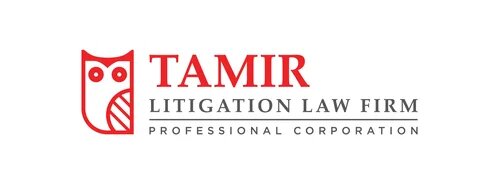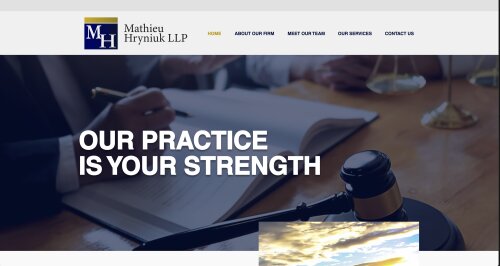Best Corporate Governance Lawyers in Canada
Share your needs with us, get contacted by law firms.
Free. Takes 2 min.
Or refine your search by selecting a city:
List of the best lawyers in Canada
About Corporate Governance Law in Canada
Corporate governance in Canada refers to the system of rules, practices, and processes by which corporations are directed and controlled. It involves balancing the interests of a company’s stakeholders, such as shareholders, management, customers, suppliers, financiers, government and the community. The purpose of corporate governance is to create a framework for achieving a company’s objectives, making prudent decisions, and operating ethically and transparently. In Canada, corporate governance law is influenced by federal and provincial statutes, securities regulations, and guidance from organizations such as the Canadian Securities Administrators and the Toronto Stock Exchange.
Why You May Need a Lawyer
Corporate governance can be complex, and there are many scenarios where it is important to seek legal advice. You may need a lawyer for:
- Setting up or restructuring a corporation and creating governance policies
- Advising on the roles and responsibilities of directors, officers, and shareholders
- Assisting with compliance with federal and provincial corporate statutes
- Dealing with conflicts of interest or breaches of fiduciary duty
- Navigating major transactions like mergers, acquisitions or dissolutions
- Handling disputes between shareholders or with directors
- Ensuring compliance with reporting and disclosure requirements
- Responding to regulatory investigations or enforcement actions
- Advice on executive compensation and corporate social responsibility practices
Legal counsel ensures that your organization is operating within the law and can help mitigate risks and protect the interests of all stakeholders.
Local Laws Overview
Canada’s corporate governance framework is shaped by several key laws and regulations:
- Federal and Provincial Corporate Statutes: The Canada Business Corporations Act (CBCA) governs federally incorporated businesses, while each province and territory has its own statute for locally incorporated companies. These laws set out the powers and duties of directors, officers, and shareholders.
- Securities Regulation: Public companies in Canada must comply with securities laws which mandate certain disclosure, reporting, and governance practices. Provincial and territorial securities commissions oversee compliance.
- Listing Requirements: The Toronto Stock Exchange (TSX) and other exchanges have additional rules relating to board composition, audit committees, and disclosure practices for listed companies.
- Codes and Best Practices: Organizations such as the Canadian Coalition for Good Governance and the Institute of Corporate Directors issue guidance and best practice recommendations, which, while not strictly law, are influential in shaping governance expectations.
- Legal Duties of Directors and Officers: These include fiduciary duties to act honestly and in good faith with a view to the best interests of the corporation, as well as a duty of care to act with diligence and prudence.
Non-compliance with corporate governance laws can result in fines, personal liability for directors, and other penalties. Staying informed and compliant is essential.
Frequently Asked Questions
What is the main objective of corporate governance in Canada?
The main objective is to provide a structure for effective management and oversight of corporations to ensure fairness, transparency, and accountability to all stakeholders.
Who is responsible for corporate governance in a Canadian corporation?
The board of directors has primary responsibility for corporate governance, supported by senior management and sometimes specialized committees such as audit or governance committees.
Are there different governance requirements for non-profits and private companies?
Yes, there are different legal requirements and best practices for non-profits and private companies compared to publicly traded corporations, but all must adhere to basic governance standards under applicable law.
What is a fiduciary duty?
A fiduciary duty is a legal obligation of directors and officers to act honestly, in good faith, and in the best interest of the corporation, placing the company’s interests ahead of personal interests.
Can directors or officers be held personally liable in Canada?
Yes, directors and officers can be held personally liable for breaches of their legal duties, including failing to comply with statutory obligations or acting in bad faith.
What are the basic requirements for a board of directors under Canadian law?
The requirements vary by jurisdiction but typically include a minimum number of directors, rules for director independence, and the establishment of audit committees for public companies.
How are conflicts of interest managed in Canadian corporations?
Directors and officers are legally required to disclose conflicts of interest and, in many cases, abstain from decision-making where a conflict exists.
What is the role of shareholders in corporate governance?
Shareholders have the right to elect directors, approve significant corporate changes, and receive information about the company, playing an important oversight role.
How often should a corporation review its governance policies?
Corporate governance policies should be reviewed regularly, at least annually, or when there are significant changes in law, regulation, or business activities.
What happens if a corporation fails to comply with governance obligations?
Consequences may include regulatory penalties, invalidation of business decisions, lawsuits, loss of reputation, and in severe cases, personal liability for directors.
Additional Resources
For more guidance and up-to-date information on corporate governance in Canada, the following resources may be helpful:
- Canadian Securities Administrators
- Office of the Superintendent of Financial Institutions (for federally regulated financial institutions)
- Provincial and territorial securities commissions
- Canadian Coalition for Good Governance
- Institute of Corporate Directors
- Government of Canada - Business and Industry resources
- Toronto Stock Exchange resources for listed companies
- Local law firms and legal professional organizations
Next Steps
If you require legal assistance in the area of corporate governance, consider the following steps:
- Identify the specific corporate governance issue you are facing
- Gather all relevant corporate documents, such as articles of incorporation, bylaws, and shareholder agreements
- Consult with a qualified lawyer who specializes in corporate or business law in your province or territory
- Prepare a list of questions and concerns before your consultation
- Continue to educate yourself using reputable resources and by staying informed about applicable laws and best practices
Proactively seeking legal advice can help prevent problems, ensure compliance, and support your organization’s success.
Lawzana helps you find the best lawyers and law firms in Canada through a curated and pre-screened list of qualified legal professionals. Our platform offers rankings and detailed profiles of attorneys and law firms, allowing you to compare based on practice areas, including Corporate Governance, experience, and client feedback.
Each profile includes a description of the firm's areas of practice, client reviews, team members and partners, year of establishment, spoken languages, office locations, contact information, social media presence, and any published articles or resources. Most firms on our platform speak English and are experienced in both local and international legal matters.
Get a quote from top-rated law firms in Canada — quickly, securely, and without unnecessary hassle.
Disclaimer:
The information provided on this page is for general informational purposes only and does not constitute legal advice. While we strive to ensure the accuracy and relevance of the content, legal information may change over time, and interpretations of the law can vary. You should always consult with a qualified legal professional for advice specific to your situation.
We disclaim all liability for actions taken or not taken based on the content of this page. If you believe any information is incorrect or outdated, please contact us, and we will review and update it where appropriate.
Browse corporate governance law firms by city in Canada
Refine your search by selecting a city.












